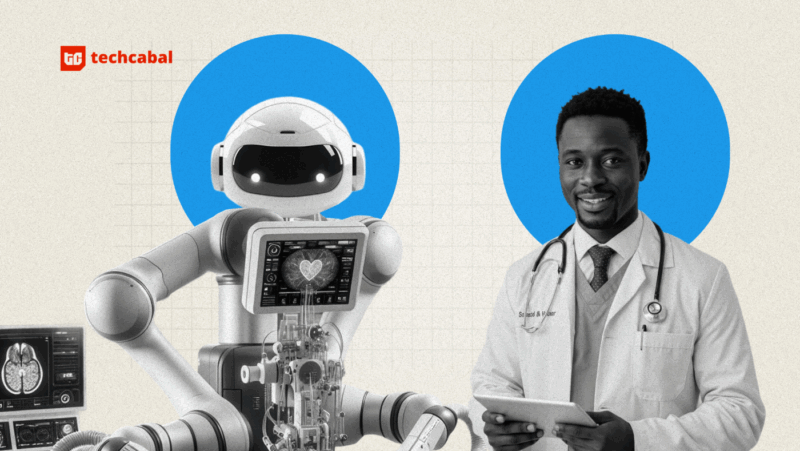The cry of a newborn is often a sign of life. But to Charles Onu, it’s also data. For the past seven years, Onu has been training machines to listen, not just for volume or pitch, but for the subtle disruptions that could signal brain injury. His startup, Ubenwa, is building AI models that analyse an infant’s cry to detect birth asphyxia, one of the leading causes of newborn deaths across Africa. The diagnosis doesn’t require blood work or lab equipment; it just needs a 10-second audio clip and a smartphone.
Onu was driven by a personal tragedy. His cousin developed hearing loss after surviving birth asphyxia, a condition caused by a severe deficiency of oxygen in the body that can lead to unconsciousness, irreversible organ damage, and death. Years later, while volunteering with health NGOs in Nigeria, he realised how common undetected complications were and how little had changed.
Launched in 2022, Ubenwa records the baby’s cry using a smartphone or a basic mic-enabled device. Its AI models then analyse the sound’s acoustic biomarkers to detect potential pathologies. The initial focus is on asphyxia, but the company is exploring other conditions, including congenital heart disease and developmental delays.
Ubenwa is one of several African startups leveraging AI to confront the continent’s severe maternal and infant health crisis. Africa has the world’s highest burden of maternal and neonatal mortality. Each year, nearly 200,000 women die during pregnancy and childbirth, and 1 million newborns die in their first month of life, according to the World Health Organisation. Sub-Saharan Africa accounts for two-thirds of global maternal deaths, according to the WHO. And while many of these deaths are preventable, detection and timely intervention remain difficult. That’s largely because critical services like fetal ultrasound, neurological screening, and postpartum follow-ups are either too expensive, too centralised, or too reliant on skilled professionals. AI, by contrast, offers scale. With the right data and smart engineering, it can compress expert-level care into tools that anyone can use.
DeepEcho is making fetal ultrasound accessible to non-specialists
If Ubenwa steps in after the baby is delivered, DeepEcho helps before the delivery. Founded in 2020 by Dr. Youssef Benkhedda and Saad Slimani, DeepEcho’s AI platform changes the way ultrasounds are performed. Traditionally, a full fetal scan takes 30 minutes and must be performed by a highly trained physician. With DeepEcho, even someone with no prior training can perform a scan in minutes. The tool automates view recognition, organ measurements, and fetal positioning, all powered by a computer-vision model trained on over 150 million ultrasound images, one of the largest datasets of its kind.
“Our model was built by Africans for Africans,” Saad Slimani, co-founder and chief medical officer, said. “We trained it on African data, tested it on American and Mexican data, and it still worked. That was a big moment for us.” 
DeepEcho’s system can reduce the time for a complete fetal anatomical survey from 30 minutes to approximately six minutes, and the company claims it’s roughly four times faster than a human sonographer. “You can tell immediately if it’s a high-risk or low-risk pregnancy,” he added. “If it’s low-risk, you don’t need a specialist to spend 30 minutes on it.” 
“AI is not an option in Africa, it’s a necessity,” he said. “Any physician scared of it does not honor his Hippocratic oath. We’re bound to help people, and if we can’t reach them ourselves, we must find solutions that can.” 
Working with the Bill & Melinda Gates Foundation, DeepEcho is developing an AI system that can detect preeclampsia—a hypertensive disorder that kills thousands of women each year—weeks before symptoms appear. Its offline version is designed for motorbike-borne community health workers, who scan pregnant women in remote areas, then upload the data whenever they find connectivity. “It’s the first time in medicine that someone with no experience can perform an ultrasound,” Slimani said.
Babymomsi is tackling postpartum mental health with an AI companion
While startups like Deepecho and Ubenwa focus on infant safety before and after birth, Babymomsi, an AI-driven maternal mental health platform, is tackling a different but equally urgent crisis: postpartum depression.
For many African mothers, childbirth ends with a baby in their arms and little structured support. Launched in 2025, Babymomsi began as a simple WhatsApp group for new Nigerian mothers trying to track feeding schedules and sleep patterns. “We realised that even with all the baby-tracking apps, moms still felt unseen. Everyone was building for the baby, no one was building for the mom,” said Parklins Ifeanyichukwu, CEO and co-founder of the company.
That insight informed Babymomsi’s pivot. What started as a baby activity logger evolved into a maternal care ecosystem designed to help mothers feel seen, heard, and supported. The platform now combines mood tracking, breastfeeding support, and postpartum mental health screening through AI-driven chat and voice companions.
Babymomsi’s core product suite includes a pregnancy tracker that uses AI to involve partners in each week of the pregnancy by predicting symptoms and prompting them with personalised care actions. “We want to end the era of dads saying, ‘I don’t know how to help.’ Our AI tells them exactly what to do—like giving a back rub or helping with chores—based on what the mom is feeling that week,” Parklins said. 
Babymomsi’s, Mommy AI, a voice-based mental health companion—“like ChatGPT, but for moms,” Parklins explained—where mothers can vent freely, talk about their insecurities, and receive emotional responses without fear of stigma or judgment. “It’s like a rage room,” he said. “Over 60% of moms feel uncomfortable talking to their partners about body changes or sadness. Mommy AI gives them a safe space.” 
Babymomsi’s AI listens for emotional cues and recommends wellness activities like yoga, sound therapy, or running clubs. In severe cases, it can guide users to professional support through NHS partnerships in the UK. “It’s a first line of care,” Parklins said. “We don’t diagnose; we support. If things seem severe, we prompt moms to seek help, but we do it gently, in their own space.” 
Though barely a year old, Babymomsi has launched its MVP across the App Store and Play Store, reaching 400 early users, and is preparing a clinical pilot with an NHS Trust in London to validate its model.
The price of building frontier health AI
Building frontier health AI in Africa is less of a sprint than a marathon, and these startups’ breakthroughs are built on the back of persistent constraints. From data scarcity and regulatory inertia to computing costs and investor skepticism, the path to scale is fraught with difficulty. For companies like DeepEcho, the fundamental hurdle is financial: attracting investors who understand the complexities of deep-tech health innovation and regulation-heavy products. “It’s challenging for VCs to understand what we’re doing. We’re African but building new IP and novel research that has not been done, which leads to doubts in investments,” noted Slimani.
This skepticism is compounded by the long go-to-market timelines endemic to health tech, which requires rigorous medical regulation and approvals like the Food and Drug Administration (FDA) before commercialisation. “Health tech startups are different. Before going to market, we need regulatory approval because of the sensitive nature of the work we do. Before getting FDA approval, it’s very hard to commercialise.”
DeepEcho’s reliance on cloud-based software runs headlong into the infrastructure and connectivity constraints of many African clinics, necessitating the development of complex offline solutions. “We’re working on an offline solution. As of today, it works on the cloud: you can take videos in a remote location, then go to a place with internet and get the report,” said Slimani. The startup faces the ongoing task of market education, convincing both hospital systems and local investors that AI can safely and effectively automate diagnostics.
For Babymomsi, the challenges are more cultural and ethical. The first key hurdle is breaking the stigma and silence around maternal mental health. In many African environments, there is a strong expectation of stoicism, making it difficult to convince mothers to openly engage with mental-health tools.
Beyond the cultural barrier, the team must navigate the highly sensitive context of their work, ensuring the ethical and safe use of AI with vulnerable users. “Because of privacy and the sensitivity of such situations, we cannot trigger any third party without the express permission of the moms. The best we’re doing is offering actionable care and making the help accessible,” noted Parklins Ifeanyichukwu, CEO and co-founder.
This requires a careful balance of privacy laws, emotional-safety safeguards, and meaningful care delivery, as the “Mommy AI” companion cannot trigger third-party intervention without express permission. While the company is securing its first-stage credibility through a planned clinical pilot with a National Health Service (NHS) Trust in London to validate its technology clinically, the long-term objective of scaling across diverse economies remains. Babymomsi plans to pursue monetisation in developed markets like the UK and the US to subsidise its goal of making the service accessible and free for 1 million mothers across Africa.
Despite the steep hurdles of data scarcity, infrastructure gaps, and deep-seated cultural stigma, the path is now clearer than ever. By marrying clinical rigour with technological ingenuity, ventures like Ubenwa, Deepecho, and Babymomsi are proving that African innovation can transform vulnerability into visibility, ensuring that the cry of every newborn and the struggle of every mother is not just heard, but immediately understood and acted upon.
This report was produced with support from the Centre for Journalism Innovation and Development (CJID) and Luminate.








